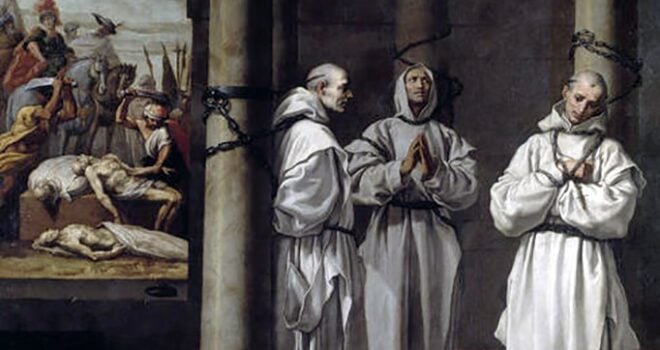About to begin praying the Gloria, Father John Baptist Bullaker, who’d received a vision two years prior of his arrest and martyrdom, was apprehended by a priest-hunter and dragged away while still vested for Mass. It was September 11th, 1642; he had been betrayed for five pieces of gold by a maid who tended the house in which he often illegally celebrated Mass.
For many people, the reality of being arrested for being a Catholic priest would be accompanied by a sense of dread, since the penalty for this “crime” was certain death. But Father John Baptist had actively prayed for this grace of martyrdom. Being apprehended at the Gloria therefore seems a fitting moment, for now he was to glorify God through his martyrdom.
Thomas Bullaker was born in Midhurst, Sussex, England, in either 1603 or 1604. Both his mother and father were devout Catholics; his father was a successful medical doctor. Thomas traveled to France for academic studies. While in France, he discerned a religious vocation to the Franciscans and entered the order in 1622, receiving the name “John Baptist.” He was ordained to the holy priesthood about 1627.
Though his initial desire was to be assigned as a missionary to the West Indies, his superior sent him to England. Father John Baptist landed in Plymouth to begin his missionary activity among his countrymen and was promptly arrested. Due to insufficient evidence of his “crime,” though, he was released.
The following twelve years saw a fruitful ministry by Father John Baptist. He donned various disguises to avoid capture. Ministering as a Catholic priest was still classified as high treason, punishable by death by means of being hanged, drawn, and quartered. Despite this threat, Father John Baptist laid aside concerns for his life that he might bring the grace of the sacraments to his brothers and sisters in Christ.
Eternal life and fidelity to Jesus and His Church, not life in this world with its allure of wealth, pleasure, and safety, were his principal motivations. He knew personally how the sacraments, especially the greatest of all the sacraments, the Most Holy Eucharist, were absolutely vital to his spiritual well-being; how could he put personal safety and comfort above the need Catholics have of receiving the sacraments? Jesus assured His disciples that one of the effects of the Sacrament of His precious Body and Blood was eternal life. For this reason, Father John Baptist was ordained. This was his raison d’etre.
At his trial for the crime of ministering as a Catholic priest, Father John Baptist spoke in his own defense. He admitted to being a priest and ministering as a priest, but he vehemently denied this meant he was treasonous. Father John Baptist demonstrated that one can be both a good and practicing Catholic and priest and be a faithful and devoted son of the crown. They were not mutually exclusive; instead, the former allowed him to excel at the latter.
The jury wavered, which prompted the judge to intervene, fearing the jury was on the verge of acquitting Father John Baptist. The judge found him guilty of high treason and sentenced him to death by hanging and being drawn and quartered. In his heart, Father John Baptist thanked God, and prayed his death would glorify Him and draw others to embrace the Church of His Son.
Father John Baptist was taken to Tyburn, where many brother priests before him had won the crown of martyrdom. Prior to his execution, Father John Baptist took the opportunity to preach his final sermon; to all those who came to witness his death, he shared the gift and the beauty of the priesthood of Jesus Christ and the Real Presence of Jesus in the Sacrament of the Altar. The Real Presence, he probably said, was precisely what Jesus said it was, His real Body, and it was the Thirty-Nine Articles of Anglicanism that departed from the express will of Jesus. Father John Baptist was ordered to be silent; he complied, knowing his death itself would speak the truth of the Eucharist.
The executioner put the noose around Father John Baptist’s neck, tightened it, and then the order came for him to hang. Before he was allowed to die, he was cut down, and the executioner began to cut into his still living, breathing body, excising his beating heart. Father John Baptist united his life and his death with that of Jesus. He died about thirty-eight years of age on October 12th, 1642. Pope John Paul II beatified Father Thomas (John Baptist) Bullaker on November 22nd, 1987, with eighty-four other martyrs of the Faith.
Reflection
St. Pio of Pietrelcina is credited with saying, “It would be easier for the world to exist without the sun, than for it to exist without the Mass.” Do we truly believe this? Do we, in as much as we can, understand what happens in the Holy Mass? What graces are afforded us through the Mass? Is the Mass, and therefore the Eucharist, the center of our lives, as it was for Blessed Thomas Bullaker? Do we make plans with the realization that Mass on Sunday (or Saturday evening) is the highest priority and nothing should displace it?
The world revolves around the sun, but do our lives revolve around the Son in the Eucharist? Are we in practice “Eucharistically centered”? Does devotion to the Eucharist inform all dimensions of our lives? Are we caviler about attending and participating in “the mystery of our Faith”? Is the Holy Eucharist the very “source and summit” of our lives?
Editor’s Note: This article is adapted from a chapter in Rev. J. Francis Sofie’s book Martyrs of the Eucharist: Stories to Inspire Eucharistic Amazement, available from Tan Books.
Carducci, V. (c. 1630). The Martyrdom of the Priors of the English Charterhouses of London Nottingham and Axholme [painting]. Retrieved from Wikimedia Commons.










